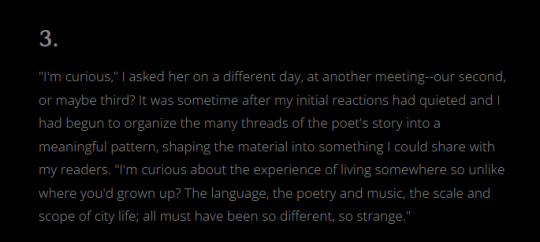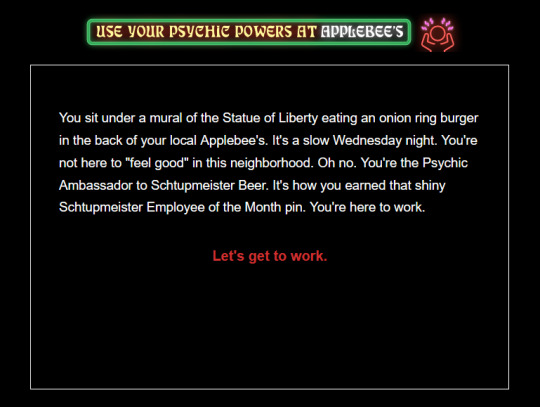#i wish there was a way you could be like yo this general theme doesn't interest me and tumblr would remove it from your fy pool
Text
no listen i really like the addition of the fyp on this forsaken website (weeks late) but it's starting to upset me how certain tags keep being shown to me (aka things posted under them) even though i've never once interacted with that fandom and i don't care for it, and when i tell tumblr this post isn't for me - the same post or something else under the same tag/fandom will come up a short scroll late. like hey maybe don't give me a feature if it won't work??
#i don't wanna have to block all the tags related to t/o/h because tumblr suddenly decided i'm supposed to love it#i feel bad for the artists i'm constantly seeing on the fyp because i'm second-hand mad at them#it just happens So Often it's really getting annoying#i wish there was a way you could be like yo this general theme doesn't interest me and tumblr would remove it from your fy pool#anyway sorry for the rant please @staff fix ur website#tumblr#wicked little talks
1 note
·
View note
Note
I like to watch a lot of animated kids shows so Ive spent a lot of time thinking like "Miraculous isnt well written as a more mature show for like teens, but is it atleast a good kids show?" and my conclusion is "No" but for nuanced reasons that I still have trouble articulating but a big one is definitely the lack of good lessons for kids to learn. Like, all the bad shit surrounding Marinette and Adriens behavior that kids could emulate aside, what kind of lessons do the writers actually write into episodes? None that I can think of aside from like "forgive your racist grandpa after he made no efforts to better himself"
And its frustrating because the concept of the akumas are an amazing concept for a show with themes about mental health, even if it was oriented at kids. Like, you could actually teach kids how to deal with negative emotions in a way thats fun but instead its more like: Someone gets really upset, gets akumatized, LB and CN beat them with brute force, LB destroys the akuma, they dont really address what caused that person being really upset, the end
A show that executes the negative emotion opponents masterfully is Princess Tutu.
Tutu, by design, cannot fight. She doesn't have any martial skills or weapons, as she has is dancing and her empathy.
She talks to the villains she faces, gets her butt kicked by them, and learns to understand them and help them through their grief.
Another example is Card Captor Sakura (Manga)
Sakura feels a great deal of Empathy for the cards she has to defeat and capture. She has to befriend the cards, and in return they help her.
Miraculous has the opportunity to do something like this, but refuses to, preferring action and combat.
And to be fair, the action and combat scenes are generally great and fun to watch. But it's always the same thing at the end of the day.
I'd love it if it explored the idea of talking to the akuma about why they're upset and finding a way to help them.
And, to keep the fun action scenes, the characters have to navigate when to talk, when to fight and when to run.
In my rewrite, at the mid-point the yo-yo is destroyed. They can still do the Miracle Cure with Chat Noir alone, but it alone can't fix the damage. They can't just hit their problems hard enough to make them go away.
So Ladybug has to turn to her empathy and compassion to help akumas, leading to her Empathy creating the magical charms to protect people from those who wish to manipulate them.
54 notes
·
View notes
Text
IF Comp Reviews Part 2
(Continued from Part 1, my micro-reviews of games I've played in IF Comp 2022.)
Glimmer by Katie Benson
I find it difficult to review games that are so obviously either personal re-tellings or blatantly about mental health. Of course there are mechanics and form to criticize, but how can I criticize a person's (potentially) lived experience?
I'm lucky in that I merely have a generalized anxiety disorder. I've never been diagnosed with depression. But I have had depressive holes consume me for small periods of time, and so I resonate with the direction this piece takes.

"The spiral is so powerful," the game says. And I know that feeling well. The game's tagline says "It's bleak out there," and I agree. Emotionally, this pieces conveys a very clear message that I understand and sympathize with. At its core, the game works.
In terms of formatting, the mid-sentence clickable words were a nice added touch, but because of the way they altered or added onto sentences, it felt jarring. Structurally I think it would make more sense if there was a way to differentiate the new text, or have it add on to the end.
But the simplicity of the rest of it is almost certainly part of the point, and I have no problem with the general lack of aesthetic.
There seems to be one essential path with only the slightest of deviations to the text depending on your choices. And I think that that's the "Glimmer" of the game's title. It's nice to think of a world where it doesn't matter what you choose - there's always someone there for you, anyway.
And I appreciate that, in IF at least, there is space for small games about big feelings.
Elvish for Goodbye by David Gurcay-Morris
While a good title is certainly not a pre-requisite for a good game, I have to say this title quickly caught my attention. It's fantastical and moody in just three words.
Aesthetically, I found the grey text hard to read on both the black and white themes. I wish it had been a bit clearer, and that the bright goldenrod of the choice text had been a bit subdued. Nitpicky as always, but I have bad eyes and there was a lot reading to be done.

This game has an immediate tenor that just screams bohemia in both good and bad ways. I think it captures that spirit quite well. Folklorika Teahouse and Vegetarian Satay Lounge, for instance, is a fantastic name for an establishment, and the game's various settings felt tonally appropriate. But there were many other places where I wish the text had just been edited down a bit more before release. There are the occasional odd turns of phrase which may be down to any number of totally reasonable factors ("I achieved my current height during my twelfth year" being one that I remembered) that normally wouldn't bother me, but this piece seems to set out to be very lyrical and poetic, and so these things count. (As an aside, the author's use of the word "logograms" makes me wonder if they, too, have recently read Ken Liu's fantastic Dandelion Dynasty series.)
Here is what I think this game is: a genuinely wonderful achievement in world-building, especially with regards to how language conveys meaning. The author has clear intelligence and wit, and the text of the story felt unlike the vast majority of "fantasy" IF that I've experienced recently. On that merit alone I think the game is worth spending time with. I believe the author delivered on the promised premise.
However, I frequently felt that the language of the game got in the way. It just felt a bit like it was being too smart for its own good, or perhaps trying too hard to sound smart. I found it funny that, as I went on, I was able to respond in ways like rolling my eyes, or suppressing a yawn. Because the shame of all of that is that I think it is a really smart game in a lot of unique ways, and it didn't need to use such florid language to convey that. With perhaps a bit more self-editing or another trained eye, I think it could have achieved that delicate tightrope walk a bit better.
Use Your Psychic Powers at Applebee's by Geoffrey Golden
What a wild swing I've taken in reviewing these three games. This final entry is a brief, quirky, choice-based game that had me genuinely laughing more often than not. (The first laugh I got was my second mind-reading session, where a boy is earnestly weighing the pros and cons of the Kool-Aid Man taking on Garfield.)

There's something about the premise of the story that was just absurd enough to draw me in, and I think it delivered wonderfully on the mundanity and trite nonsense of a future where mind-reading is possible and it's used solely to promote Schtupmeister.
Interactive fiction comes in all shapes in sizes, and I'm glad that bite-sized games with high replayability value like this exist.
Now please excuse me while I grab a cold Schtup and watch Turbonator take on Skullcrush in Duncanville.
5 notes
·
View notes